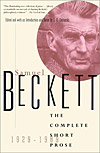John Edgar Wideman's Bookshelf

PAGE 2
Samuel Beckett: The Complete Short Prose, 1929–1989
A Beckett story possesses the tangibility, the inscrutability of fleeting thoughts, of fleeting sensations and emotions. His fictions create a haunting reality, though you may never be quite sure what's happening because the language of a Beckett story is disembodied; it supplies few of the referents and props that are the staples of conventional fiction. Instead the reader is stitched into a slightly out of focus tapestry of words, both familiar and strangely elusive, and hears the recognizable mumble of those voices inside our minds, the sea of language we inhabit, always present in the background, buoying, releasing, drowning the words we seek to make sense of the world, the utterances we're almost ready to speak aloud or others speak at us but never quite get right. As if there's truly nothing but this ebbing and rising white noise of words, this ocean, this forest of language somewhere out there and you're on a bare stage like in a Beckett play and the whole universe has fallen away (or you've fallen from it); not much time left or all the time in the world remains and here you are alone, or perhaps with another you wish for or wish away, who's summoned by your shudders, sermons, cries, or belly laughs to keep you company before no one, anywhere, ever listens again.
A Beckett story possesses the tangibility, the inscrutability of fleeting thoughts, of fleeting sensations and emotions. His fictions create a haunting reality, though you may never be quite sure what's happening because the language of a Beckett story is disembodied; it supplies few of the referents and props that are the staples of conventional fiction. Instead the reader is stitched into a slightly out of focus tapestry of words, both familiar and strangely elusive, and hears the recognizable mumble of those voices inside our minds, the sea of language we inhabit, always present in the background, buoying, releasing, drowning the words we seek to make sense of the world, the utterances we're almost ready to speak aloud or others speak at us but never quite get right. As if there's truly nothing but this ebbing and rising white noise of words, this ocean, this forest of language somewhere out there and you're on a bare stage like in a Beckett play and the whole universe has fallen away (or you've fallen from it); not much time left or all the time in the world remains and here you are alone, or perhaps with another you wish for or wish away, who's summoned by your shudders, sermons, cries, or belly laughs to keep you company before no one, anywhere, ever listens again.



